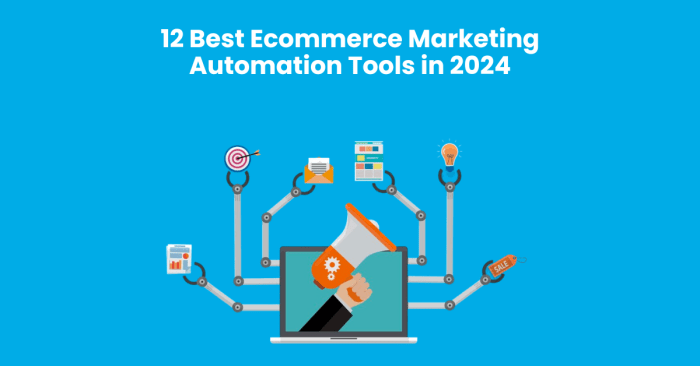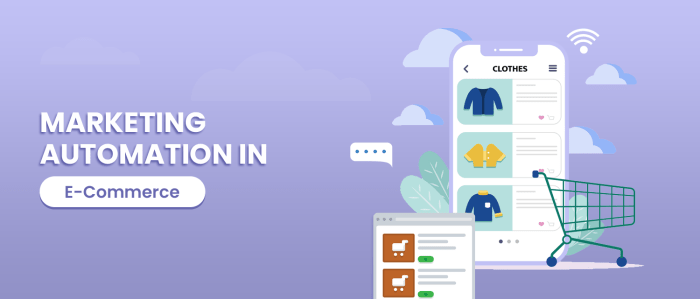Embark on a journey into the world of Ecommerce Marketing Automation for Small Businesses, where efficiency meets innovation. Discover how automation tools revolutionize marketing processes and drive growth for small enterprises.
Explore the benefits, key tools, strategies, and more in this comprehensive guide to enhancing your business through automation.
Overview of Ecommerce Marketing Automation for Small Businesses
Ecommerce Marketing Automation involves the use of tools and software to automate marketing tasks and processes for online businesses. This technology is particularly beneficial for small businesses as it allows them to operate efficiently and effectively without the need for a large marketing team.Automation tools can streamline marketing processes for small businesses by automating repetitive tasks such as email marketing, social media posting, customer segmentation, and lead nurturing.
By using these tools, businesses can save time and resources while also improving the overall effectiveness of their marketing campaigns.
Examples of Successful Implementation of Marketing Automation in Small Businesses
- One example of successful marketing automation in a small business is the use of automated email campaigns to engage with customers and drive sales. By setting up triggered emails based on customer behavior, businesses can deliver relevant content at the right time, leading to increased conversions.
- Another example is the use of automation to track customer interactions and behavior on a website. By analyzing this data, businesses can personalize their marketing efforts and tailor their messaging to specific customer segments, resulting in higher customer engagement and retention.
- Furthermore, small businesses can use automation to manage their social media presence more efficiently. By scheduling posts in advance and analyzing performance metrics, businesses can optimize their social media strategy and reach a wider audience with minimal effort.
Benefits of Ecommerce Marketing Automation for Small Businesses
Marketing automation offers numerous benefits for small businesses looking to streamline their processes and grow their online presence. By leveraging automation tools, businesses can enhance efficiency, boost productivity, and drive better results in their marketing efforts.
Improved Efficiency and Productivity
- Automating repetitive tasks such as email campaigns, social media posts, and customer follow-ups saves time and allows small businesses to focus on more strategic activities.
- Automation ensures consistency in marketing efforts, reducing the risk of human error and enhancing overall productivity.
- By automating workflows and processes, businesses can streamline operations and improve their overall efficiency.
Lead Generation and Customer Retention
- Marketing automation enables small businesses to effectively nurture leads through personalized and timely communication, increasing the chances of conversion.
- Automated lead scoring helps businesses identify and prioritize high-quality leads, leading to more targeted marketing efforts.
- Through automated customer segmentation and personalized messaging, businesses can enhance customer engagement and improve retention rates.
Cost-Effectiveness and ROI
- Marketing automation tools are often cost-effective, offering small businesses the ability to reach a larger audience without a significant increase in expenses.
- By automating marketing processes, businesses can reduce the need for manual intervention, saving time and resources in the long run.
- Measurable results and analytics provided by automation tools allow businesses to track their ROI and make data-driven decisions for future marketing strategies.
Key Automation Tools for Small Businesses
When it comes to marketing automation, there are several tools available in the market that cater to the needs of small businesses. Choosing the right automation tools can help streamline processes, improve efficiency, and drive better results. Here are some essential marketing automation tools suitable for small businesses:
Email Marketing Automation
- Mailchimp: A popular platform that offers email marketing automation features such as email campaigns, audience segmentation, and analytics.
- Constant Contact: Another option for small businesses looking to automate their email marketing efforts with features like email templates and contact management.
Social Media Automation
- Hootsuite: A comprehensive social media management tool that allows scheduling posts, monitoring conversations, and analyzing performance across multiple platforms.
- Buffer: Ideal for small businesses to schedule and publish social media content efficiently on various channels.
CRM Automation
- HubSpot CRM: A user-friendly CRM platform that offers automation features for contact management, lead tracking, and sales pipeline management.
- Zoho CRM: An affordable option for small businesses to automate customer relationship management processes and improve sales productivity.
Workflow Automation
- Zapier: A popular tool that connects different apps and automates workflows to streamline processes without the need for coding.
- IFTTT (If This Then That): An automation platform that allows users to create custom workflows by connecting various apps and devices.
Choosing the Right Automation Tools
When selecting automation tools for your small business, consider factors such as your specific marketing needs, budget constraints, ease of use, integration capabilities, and customer support. It’s essential to choose tools that align with your business goals and can scale as your business grows.
Implementing Ecommerce Marketing Automation Strategy

Developing a tailored automation strategy for small businesses is crucial in maximizing the benefits of marketing automation. By following specific steps and guidelines, businesses can effectively integrate automation into their existing workflows to streamline processes and drive revenue growth.
Setting Clear Goals and KPIs
Before implementing any automation strategy, it is essential to establish clear goals and key performance indicators (KPIs) to measure the success of your efforts. This will help you stay focused on what you want to achieve and ensure that your automation efforts are aligned with your business objectives.
- Define specific goals such as increasing conversion rates, improving customer retention, or boosting sales.
- Set measurable KPIs that will help you track the performance of your automation campaigns, such as click-through rates, open rates, or revenue generated.
- Regularly monitor and analyze the data to make informed decisions and optimize your automation strategy based on the results.
Integrating Automation into Existing Workflows
Integrating automation into your existing marketing workflows can be a seamless process if done correctly. Here are some tips to help you effectively incorporate automation into your business processes:
- Identify repetitive and time-consuming tasks that can be automated, such as email marketing, lead nurturing, or customer segmentation.
- Choose the right automation tools that align with your business needs and goals. Ensure that the tools you select are user-friendly and provide the necessary features to support your automation strategy.
- Train your team on how to use the automation tools effectively and ensure they understand the purpose and goals of automation within your organization.
- Create a seamless workflow by integrating different automation tools and platforms to work together cohesively. This will help eliminate silos and ensure a smooth transition to automated processes.
Final Conclusion

In conclusion, Ecommerce Marketing Automation for Small Businesses offers a game-changing approach to marketing. By embracing automation, businesses can boost efficiency, drive revenue, and stay ahead in the competitive landscape. Dive into the realm of automation and unlock new possibilities for your business today.
FAQ Compilation
How can Ecommerce Marketing Automation benefit small businesses?
Automation can streamline marketing processes, improve efficiency, enhance lead generation, and contribute to better customer retention.
What are some essential automation tools for small businesses?
Popular automation tools include email marketing platforms, CRM software, social media schedulers, and analytics tools.
How can small businesses choose the right automation software?
Businesses should consider their specific needs, budget constraints, scalability of the software, and ease of integration with existing systems.


